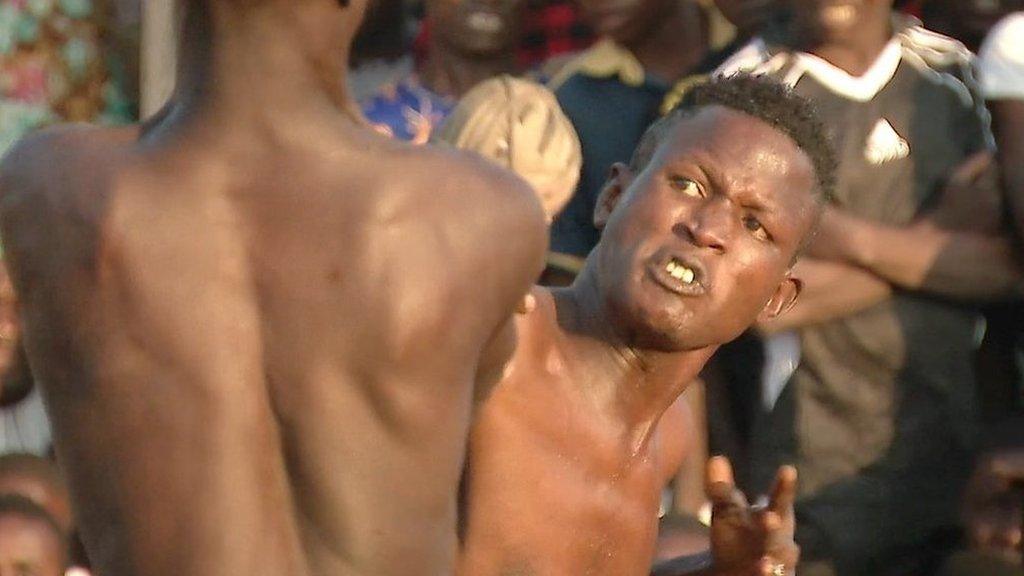Dambe: The Nigerian combat sport with worldwide aspirations
- Published
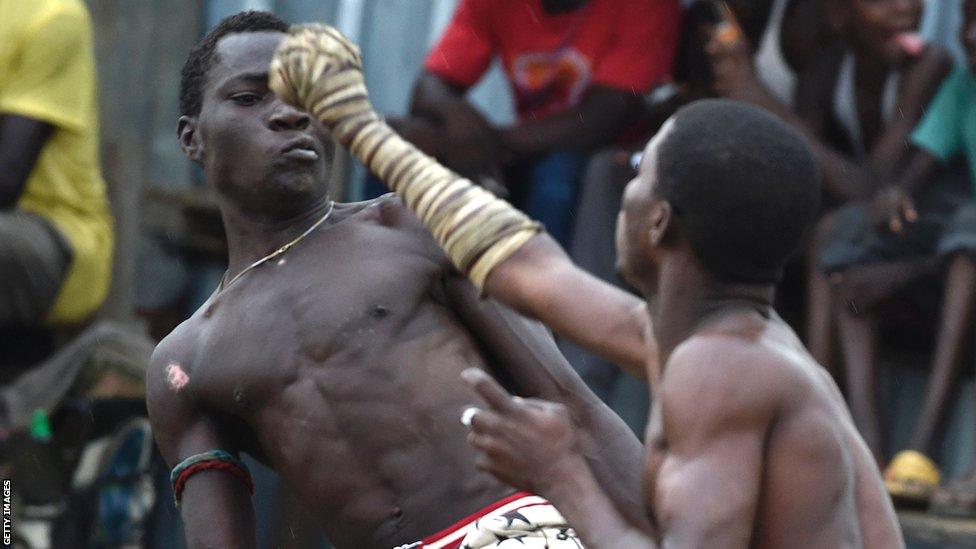
There are no formal weight categories in Dambe. Fighters are mainly matched on age and size.
An ancient sport where broken jaws or ribs are the signs of victory. You might think boxing. Or perhaps martial arts. But what of 'Dambe'?
A brutal style of combat, Dambe is a traditional sport associated with the Hausa people, one of the largest ethnic groups in Africa.
It may be steeped in tradition, with its origins said to date back to the 10th century, but it is fast adapting to the modern world, attracting millions and millions of views online in recent times.
"We've gone from having our content watched by 200,000 people in 2017 to over 24 million in 2019," Dambe promoter Anthony Okeleke told BBC Sport Africa.
That's quite a rise for a sport that is not for the faint-hearted.
Dambe is a combat sport where the goal is to 'kill' your opponent by knocking them to the floor.
This can be achieved with either a kick or a punch, with fights lasting a maximum of three rounds. However there is no time limit to each round, which is only completed when an opponent or an official calls for a stop or the opponent is 'killed', should any part of his body hit the ground.
The fighters bind their punching hand with a rope called 'Kara'. The aim? To make their arm, which is known as the 'spear' in the sport, as hard as possible because this is their primary weapon. The weaker hand is used as shield.
The sport was historically practiced by Hausa butchers, in West Africa, around harvest or festival time and was considered a test of bravery.
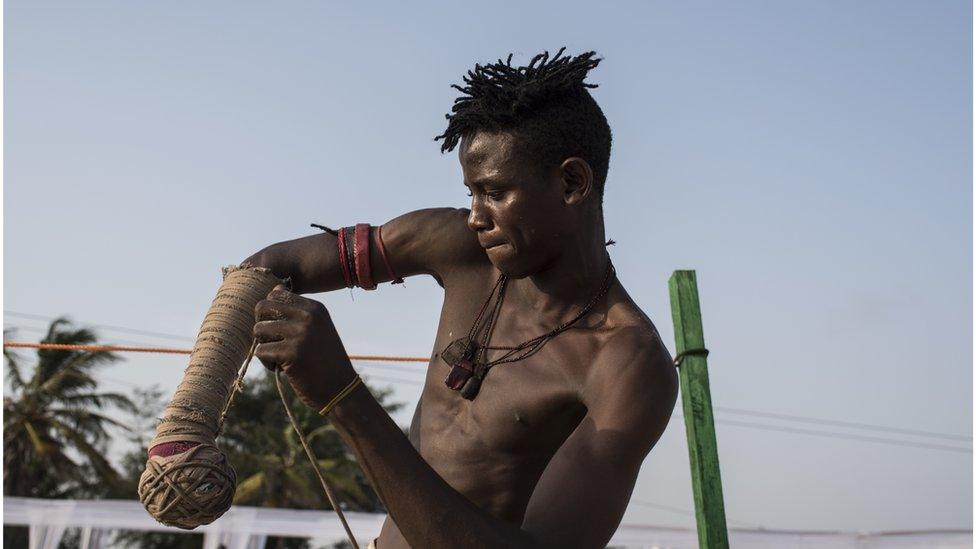
The hand bound in rope is known as the 'spear', while the other hand - the 'shield' - is used to block
"Fishermen and butchers were the ones that started traditional wrestling in Zamfara, Nigeria," Alhaji Aminu Goje, head of the Lagos Hausa association, told BBC Sport Africa.
"It started when these two parties began selling or exchanging their fish and meat. There was always a festival and then there would be a fight."
It then became a way of preparing men for war and was also used, on occasion, as a rite of passage for marriage, with this tradition still observed in some parts of Northern Nigeria.
Today though, Dambe is practised by far more than just butchers and fishermen.
Tradition meets Modernity
The sport has seen a huge rise in popularity as fights became more popular on YouTube, with teams of fighters travelling across Nigeria as they take part in festivals.
"Over 60% of our views are from outside Nigeria," said Okeleke, who promotes one of Nigeria's most popular teams, the Dambe Warriors group. "Our top five countries include Indonesia, the Philippines and the United States.
"Generally-speaking, Asia is a martial arts continent so it is easy for them to relate to Dambe."
During the coronavirus pandemic, as many millions stay at home, viewing figures have risen - with the videos on Dambe Warriors' YouTube, external channel having attracted another 2m views, while nearly 15,000 have subscribed.
Dambe: Fast, furious fighting with a growing global audience
Part of this buzz came after a channel dedicated to the Ultimate Fight Championship posted a video about Dambe, external in March.
Meanwhile, another video - this time by BBC Sport Africa in December - prompted Nigeria's Sports Minister, Sunday Dare, to announce a partnership to set up a national league.
Officials were in the process of designing a framework for the league when the coronavirus pandemic struck.
The outbreak has also delayed the inaugural international Dambe event, which was set to be held in the northern Nigerian city Kano with fighters coming in from overseas, from Europe and Asia, for the first time.
Relative riches
While it may be growing, Dambe's prize purse compared to other combat sports is still comparatively low.
Victorious fighters can earn between $20 to $500 in addition to individual gifts from spectators.
"I have land, motorcycles and goats," says Kehinde Alabi, a fighter with Dambe Warriors. "I have so many things I got while fighting Dambe."
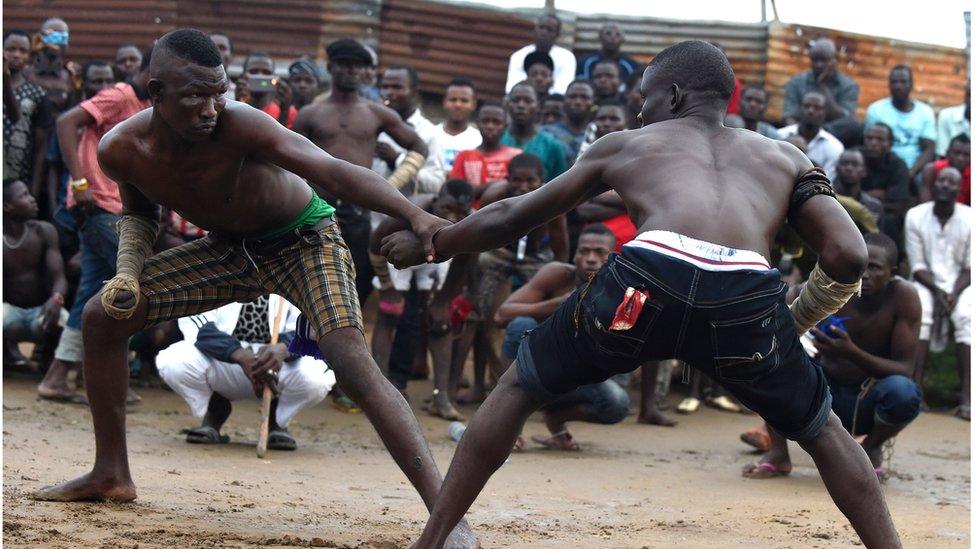
Dambe is a traditional practice of the Hausas in West Africa whose origins are said to date back over 1,000 years
For fighters though, it's more than just the money and fame that now comes with being involved in the sport.
For Alabi's team-mate Bahagon Ango Argungu, the money may be important but it's the passion that keeps him going.
"I can't go a day without fighting. I prefer to fight every day because it gives me strength," he told BBC Sport Africa. "Whenever I lose in a fight, I feel furious. I feel the urge to fight someone and win the battle."
However as with any combat sport, there are risks and critics.
Some believe the sport is a relic, where the dangers outweigh the positives, which belongs to the past.
While many are left with broken noses and countless scars, some fighters have had to retire early from sport because of the damage caused to their brains.
"Yes, it's dangerous but we have medicine - both local and foreign medicine," says Warrior coach Ibrahim Abudullah. "The medicine will (ward off) the danger."
Thankfully, the sport is far less vicious than it used to be. In the past, fighters were permitted to wrap glass deep into their Karas but that practice has now been outlawed.
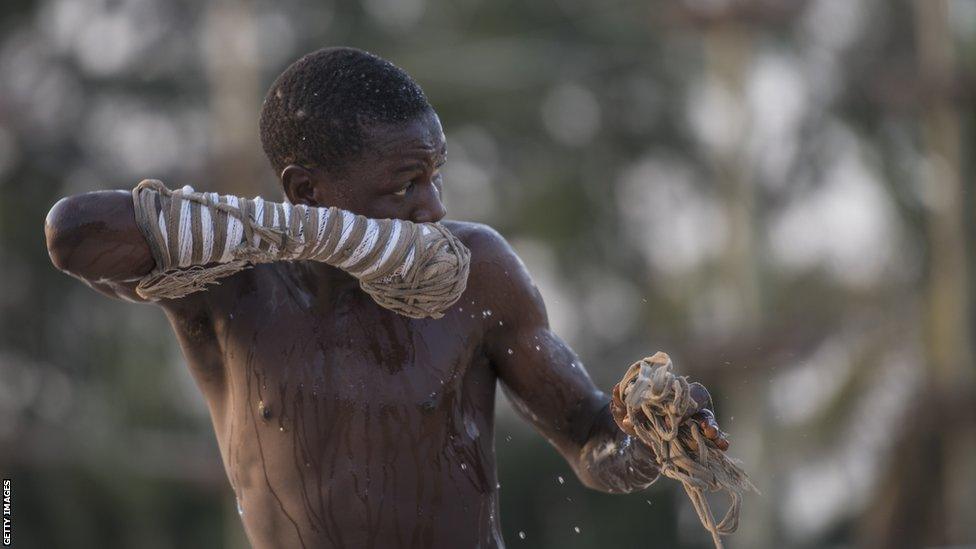
A young Dambe boxer covers himself with water after a fight
But nothing can remove the way in which Dambe is rooted in the Hausa people's culture.
Now the hope is that the sport founded in the deep and distant past can use the digital age to outgrow its local origins and become known across the planet.
"Every Hausa man, anywhere in Nigeria, knows of the importance of Dambe - it is part of us," adds Alhaji Aminu Goje.
"We are proud of Dambe and would like to go anywhere in the world to watch it. We want it to be celebrated just like the way football is."
- Published4 December 2019
